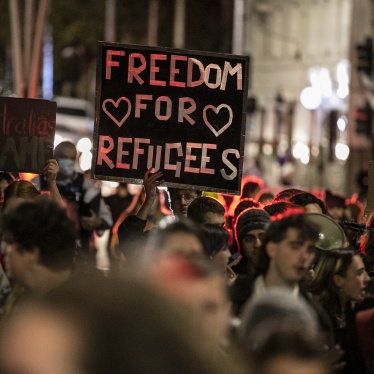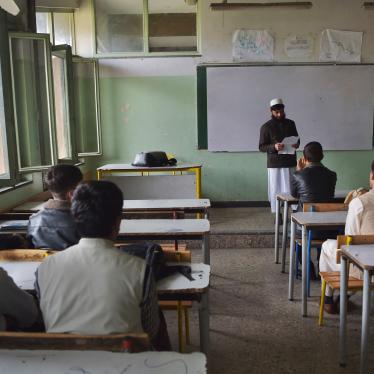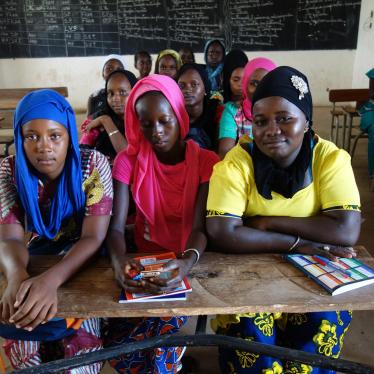Good Afternoon Chairperson Lantos, Chairperson Wolf, members of the Caucus
My name is Widney Brown, I am the advocacy director of the Women's Rights Division of Human Rights Watch.
For more than twenty years the people of Afghanistan have suffered severe violations of their human rights. These abuses have been perpetrated by the various governments of Afghanistan, by independent armed forces, and by foreign forces. As a consequence of these violations, the Afghan people now face significant obstacles as they seek to restore peace and security, return and integrate millions of refugees and internally displaced persons, establish the rule of law, rebuild civil society, and promote and protect women's rights.
The creation of an interim administration in Kabul, and the physical and institutional reconstruction of the country at large, offer a unique opportunity for instituting human rights protections into Afghanistan's political and societal structures.
The Bonn Agreement of December 5, 2001, endorsed by Security Council resolution 1383 of December 6, 2001, acknowledges the centrality of human rights in Afghanistan's future, and calls upon the United Nations to assist Afghanistan in their promotion and protection.
Human Rights Watch recognizes that restoring human rights is central to the successful reconstruction of Afghanistan. However, we also see human rights as an important component to ensuring Afghanistan's future security and stability.
In our view, security and human rights are inexorably linked. Security is a foundation for respect of human rights; but promotion of rights is also a key to building security. For instance, the reporting and prosecution of past abuses can serve to deter future abuses and potentially sideline abusers from positions of power.
There are several areas in the reconstruction effort that now need special attention.
Improving Security International assistance is urgently needed to improve security in Afghanistan and to safeguard what fragile peace and stability already exists.
Chairman Hamid Karzai, in his appearance before the United Nations last month, requested an extension of the current international force (ISAF) beyond Kabul to help the interim authority ensure security during the current political transition. On February 6 of this month, the U.N. Special Representative to Afghanistan, Lakhdar Brahimi, noted to the Security Council that "ordinary Afghans, members of the interim authority, and even warlords" have called for the expansion of ISAF forces to the rest of the country.
Human Rights Watch supports the request of Chairman Karzai and Mr. Brahimi to extend the ISAF force. According to our information, serious abuses of authority are being committed by local commanders in many areas; in addition, armed conflict between rival warlords and their forces is reported in several provinces. There are also troubling reports of civilians targeted for harassment based on their ethnic backgrounds. In some areas, humanitarian agencies have been forced to evacuate their offices during hostilities, and must constantly navigate rivalries between ethnically based forces in delivering assistance.
The lack of security has exacerbated displacement of people to urban areas and neighboring countries, putting many of the displaced at risk of violent attacks, rape and abductions, extortion, discriminatory treatment, and theft. Insecurity has also made it difficult for women in many areas to enjoy the restoration of their rights under the interim administration. In effect, lack of security often means that women are deprived of the ability to participate in the ongoing work of this crucial post-conflict period, thus contributing to their continued marginalization.
Human Rights Watch therefore agrees that an international force is needed immediately to secure other cities and key intermediary roads. We call on the Security Council to expand the mandate of ISAF accordingly.
Rebuilding Justice Systems
Afghanistan's legal system urgently needs to be rebuilt consistent with international human rights standards. In coming years, major resources are going to be needed for retraining and recruiting new jurists, prosecutors, defense attorneys, police officers, and court personnel. Additional funds will also be needed to rebuild courts, jails, and prisons.
Failure to ensure the rebuilding of an effective justice system will undermine the security within the country. It will be a further obstacle to women's participation in government and other reconstruction programs. In post conflict situations, women often report that the conflict-related violence they experienced is simply replaced by violence at the hands of demobilized combatants - often family members. Failure to address violence against women in the family and community through an effective justice system will ensure that women cannot participate on an equal basis in post conflict reconstruction and government.
In rural areas, the slow process of developing a reliable and fair system of justice will need early attention. Current rural justice mechanisms (i.e., village shuras), whatever else their advantages, are not adequate to address serious criminal offenses; and, as quasi-political entities, they are unfair fora for property disputes, which will be a major issue in coming years. In addition, village systems have traditionally been unable to fairly address crimes against women. We hope that all reconstruction efforts will target rural areas as well as urban - so as to address these problems.
The U.N. mission's work as envisioned under the Bonn Agreement includes investigating human rights abuses and recommending remedial measures. In addition, the Bonn Agreement calls for the establishment of an independent domestic human rights commission in the Afghan government, to be assisted by the U.N. Mission. The Commission can help screen and train police and Afghan security forces, as well as monitor human rights abuses and do human rights education in the schools. The U.S. Congress should earmark funds to provide assistance and support for the creation of the Commission.
The U.N. Security Council should adopt a resolution that directs the U.N. Mission to support the domestic human rights commission in Afghanistan and pursue U.N.-led human rights initiatives aimed at establishing accountability for serious human rights crimes. Human Rights Watch urges the members of this committee to press the U.S. government to support such a resolution.
Accountability for past serious abuses will also have to be addressed. General Assembly Resolution 220 of December 14, 2001 recognizes that "the accountability of perpetrators of grave human rights violations is a key factor in ensuring reconciliation and stability" - a position that was articulated in 2000 by the United Nations Brahimi Report on Peacekeeping and embraced by Secretary-General Kofi Annan.
We also hope that the U.S. government will support efforts at the U.N. Security Council to create a Committee of Experts to be tasked with investigating past abuses, consulting with Afghan leaders, and suggesting appropriate measures to address accountability and justice concerns.
We believe that addressing the above issues will be essential for the Afghanistan peace process to succeed. The international community must not allow a situation in which Afghanistan once again slips into lawlessness and anarchy and its people continue to suffer. We are confident that you share this view.
Involvement of Women in Reconstruction Efforts
Afghan women have been actively engaged with the international donor community, U.N. agencies, and the World Bank, to set their priorities and agendas for the effective participation of women in the reconstruction of Afghanistan. International donors now have the opportunity to implement commitments made regarding the inclusion of Afghan women as decision-makers in the reconstruction effort. As the relief and reconstruction effort is being planned, women have critical information about how to ensure that such relief actually reaches the women of Afghanistan, particularly rural, widowed, illiterate, disabled, internally displaced, and returning refugee women. Women leaders at the local level also have a critical role to play in ensuring women's participation in development programs: their involvement facilitates dissemination of information through networks of women and women's rights NGOs. Towards this end, international agencies and donors -including the United States- should press to ensure that Afghan women are appointed to senior positions in the government.
Women's rights must be prioritized in Afghanistan's reconstruction effort. Under the interim government arrangements a Judicial Commission is tasked with rebuilding the domestic justice system that will operate fully in accordance with international human rights standards. In light of the historical pattern of systematic discrimination against and persecution of women in Afghanistan, it is vital that efforts be made to pressure Afghanistan's new government to establish laws guaranteeing women's rights to education, political involvement, free expression, mobility, employment, and health care. U.N. human rights gender advisors will be a vital force in pushing for these protections; but again, advisory teams on human rights will require funding. Congress should earmark Afghanistan reconstruction funds specifically for this purpose.
Refugees
Independent human rights monitoring on conditions inside Afghanistan (as mentioned earlier) is critical also to the repatriation and return process for Afghan refugees and internally displaced persons. Refugees and returnees can only make a voluntary decision about return to Afghanistan if they have access to reliable, impartial, and accessible information concerning conditions in their home areas. Funding and support for in-country human rights monitoring is therefore a priority from the standpoint of protecting refugees.
In host countries, like Pakistan and Iran, screening mechanisms will need to be put in place for those refugees who are unable or unwilling to return to their own countries. Screening must be fair and impartial and according to recognized international standards. Funding for such programs - implemented with coordination by UNHCR - is essential if these standards are to be met.
Children and Education
Human Rights Watch believes that education is one of the most important foundations for Afghanistan's future. The United States, in providing assistance to Afghanistan, should put special emphasis on establishing or reestablishing schools throughout Afghanistan so that every child has access to education. Well-funded schools, which also provide meals and clothing, can help to counteract the factors which cause parents to place children in other inadequate institutions, or keep them at home.
Human Rights Watch agrees with many of the objectives of the Afghanistan Freedom and Reconstruction Act of 2001 and hope that in fiscal year 2003 Congress will greatly increase the funding for reconstruction. However, we are concerned that the lack of coordination among donors means that funding is happening on an ad hoc basis - of great concern, for instance, is the fact that to date, the Women's Ministry has yet to be funded despite numerous calls of support for restoring women's rights in Afghanistan. Congress should designate funding for the Women's Ministry in next year's budget and urge the administration and the UN to immediately release funds currently available to the ministry.
It is time for the U.S. government, other donor governments and the UN and its related agencies to move from rhetoric to concrete actions - doing so in a transparent manner that allows Afghans themselves to evaluate whether progress is being made, critical life supporting needs are being met and whether human rights are being restored. Congress can play an important role in this process, sustaining the interest and commitment of the American people to help the Afghan people in the rebuilding of their own country.
Thank you







